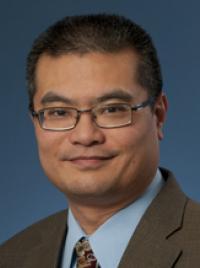
Dr. Liu graduated sum laude from the University of Toronto medicine program, followed by residencies at the University of Toronto and a fellowship at the Dana Farber Harvard Cancer Center in Boston. He was Assistant Professor of Medicine at Harvard Medical School before returning in 2006 to the Ontario Cancer Institute–Princess Margaret Hospital. Dr. Liu’s major research focus is in molecular prognostic factors and pharmacogenomics of lung and esophageal cancer, with additional interest in head and neck, pancreatic, ovarian and testicular cancers, mesothelioma and thymoma. Trained in clinical and molecular epidemiology, he is the principal investigator of over three dozen completed, ongoing and upcoming cancer pharmacogenomic and molecular epidemiologic analyses of cancer observational studies and clinical trials funded by the National Cancer Institute (US), National Cancer Institute of Canada Clinical Trials Group, Canadian Cancer Society Research Institute, the Canadian Institute of Health Research, the Ontario Institute of Cancer Research, Cancer Care Ontario, Doris Duke Foundation and the Lung Cancer Foundation of America. As Professor of Medicine, Medical Biophysics, Pharmacology and Toxicology, Institute of Medical Science at the University of Toronto, and Professor of Epidemiology at the Dalla Lana School of Public Health at the University of Toronto, and co-author of over 350 peer-reviewed articles, Dr. Liu has research interests in epidemiological outcomes database methods, novel analyses of high dimensionality biologically rich data, pharmacogenomic analyses of conventional and molecularly targeted agents using primary human xenograft models, patient-reported outcomes in pharmacogenomics, and knowledge translation of personalized medicine and pharmacogenomic algorithms into clinical practice. A major area of research is the use of machine learning approaches for analysis of symptoms and toxicity of cancer, and natural language approaches in large scale electronic health data analysis in cancer. He is a member of the Computational Biology and Medicine Program at Princess Margaret Cancer Centre.

 https://orcid.org/0000-0002-2603-7296
https://orcid.org/0000-0002-2603-7296